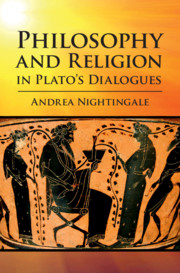Book contents
- Philosophy and Religion in Plato’s Dialogues
- Philosophy and Religion in Plato’s Dialogues
- Copyright page
- Dedication
- Contents
- Figures
- Acknowledgements
- Introduction
- Chapter 1 The Forms, the Good, and the Divine
- Chapter 2 Eternal Longings
- Chapter 3 Dialogue of Self and Soul
- Chapter 4 Wings of Desire
- Chapter 5 The Gods Made Visible
- Conclusion
- Bibliography
- Index
Introduction
Published online by Cambridge University Press: 15 April 2021
- Philosophy and Religion in Plato’s Dialogues
- Philosophy and Religion in Plato’s Dialogues
- Copyright page
- Dedication
- Contents
- Figures
- Acknowledgements
- Introduction
- Chapter 1 The Forms, the Good, and the Divine
- Chapter 2 Eternal Longings
- Chapter 3 Dialogue of Self and Soul
- Chapter 4 Wings of Desire
- Chapter 5 The Gods Made Visible
- Conclusion
- Bibliography
- Index
Summary
In ancient Greece, philosophers developed new and dazzling ideas about divinity. These thinkers drew on a deep well of poetry, myth, and religious practices even as they set out to construct new theological ideas. Ancient Greek religion had a wondrous heterogeneity – rituals and cult practices varied dramatically in different geographical regions. Greek religion was far more open to diverse theological ideas than monotheistic religions. In contrast to the sacred scriptures of the monotheists, Greek religion relied on a vast array of myths handed down from one generation to another through poetry and song. These myths surrounded and sustained religious rituals and festivals. In Greek culture, there was no separation of religion and state – to live in a political community meant that one participated in religious rituals and festivals.1 Indeed, Greek city-states organized almost all public religious events.
- Type
- Chapter
- Information
- Philosophy and Religion in Plato's Dialogues , pp. 1 - 44Publisher: Cambridge University PressPrint publication year: 2021



